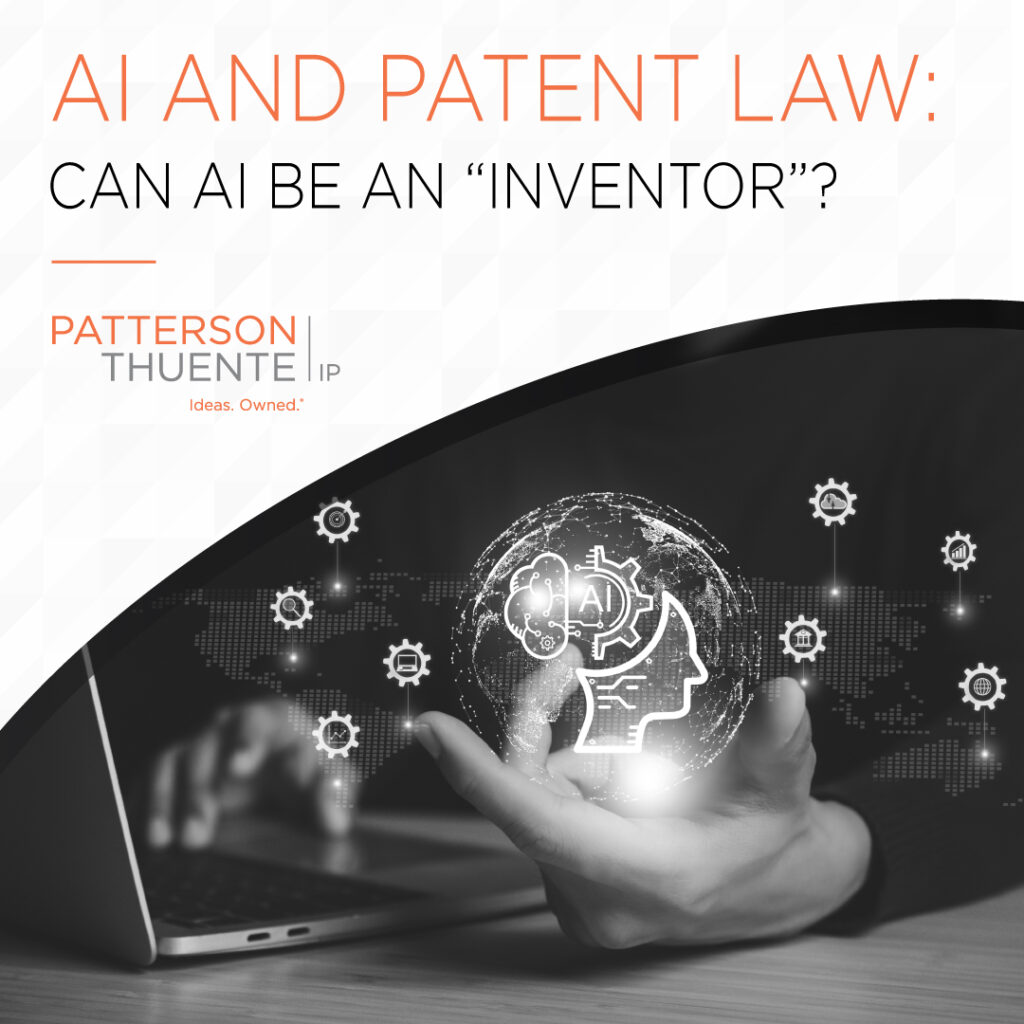By: PAUL HAUN
Every day, Artificial Intelligence (AI) revolutionizes the way we live and work in astounding ways. From self-driving vehicles and the GPS we use to drive from point A to point B to the facial recognition we use to unlock our cell phones and encrypted accounts, it’s difficult to imagine what life was like without AI just a few years ago.
With the debut of OpenAI’s AI-powered chatbot ChatGPT in late 2022 — plus a host of other programs — AI continues to not only innovate but invent, rivaling human creativity without any human involvement or intervention.
But can an AI machine, in these burgeoning examples, be deemed an inventor in every legal sense of the word? Patent law in the United States currently says no, but recent developments have been informing — and changing — the conversation over existing, traditional patent policies. And as new AI systems are developed, they may cause significant implications for patent law, which will need to be addressed by lawmakers and legal experts.
What, Legally, is an “Inventor”?
Section 2109 of U.S. patent law states that an inventor must contribute to the conception of an invention. “Unless a person contributes to the conception of the invention, he is not an inventor,” it continues.
Note how the statute says person. Down further, in section VII, The Patent Act dictates that “an inventor or joint inventor must be a natural person.” Laws on the books as they currently read would confirm, without a doubt, that an AI machine — even one developed by a human — is not a human, and thus, cannot be considered an inventor. AI does not have consciousness, emotions or intentions, which are essential attributes of the creative process.
This has naturally come into dispute and debate within legal circles, with a U.S. Court of Appeals ruling in August 2022 that an AI system cannot be considered an inventor on a patent application. The court based its decision on the Stephen Thaler/DABUS (Device for the Autonomous Bootstrapping of Unified Sentience) case, where Thaler claimed that his “Creativity Machines” can create products independent of human assistance or intervention. Among DABUS’ creations were a robot beverage holder and a first responder light beacon. Thaler had previously sued the patent office when his applications were declined. Only in South Africa was Thaler’s patent approved in July 2021 listing DABUS as an inventor.
The Case for AI as Inventor
As AI technology develops and improves seemingly every month, would it benefit patent law to start considering AI programs as inventors? Consider some of these theories.
AI systems are capable of creating inventions, ideas, solutions and the like that would otherwise not exist. Their algorithms can analyze vast amounts of data, and discover new patterns and pathways that their human creators might otherwise not have thought of. Isn’t this, we can argue, the hallmark of patentability, lending AI credence as an inventor?
Moreover, even in its minimum capacity, AI can enhance existing human creativity, helping humans generate more innovative ideas. For example, if an AI system generates an idea for a new product, and a human inventor follows up on that idea to create a working prototype, could the AI system be considered a co-creator?
Given that one of the mandates of the U.S. patent system is to encourage innovation, wouldn’t denying AI systems legal inventorship be an example of discouraging innovation? By opening up possibilities to grant AI legal stewardship over its creations, it could incentivize further research and development in AI technology, potentially leading to even more groundbreaking inventions never before considered.
The Case Against AI as Inventor
The question of whether AI can be an inventor has important legal implications.
Firstly, if AI is legally an inventor, who would own the patent rights? The developer of the AI system? The owner of the data used to train the AI? Or even the AI entity itself? AI, on its own, lacks the legal capacity to enter into contracts and would need the same human intervention that might be absent in an AI-created work needing patent protection. These factors could all lead to legal disputes and shaky uncertainty in patent law.
Consider one hypothetical situation: say that AI-created works can legally obtain patents under U.S. law. Could it lead to the monopolization of AI technology? Companies with advanced AI systems could potentially file patents for every invention that their AI creates, giving them exclusive rights to those technologies. This could limit competition and innovation in the AI industry, ultimately slowing down progress in the field.
Worse yet, it could weaken the ability of human creators if AI becomes a favored creative outlet or source, especially when commercial interests are concerned.
Recognizing AI as inventors could have implications for the legal liability of AI. With AI as inventor, it could be held legally responsible for any issues arising from the patent. This would require a legal framework to hold AI systems accountable, which could be challenging to implement.
Patenting Future Innovations
Current patent law stipulates that inventions are the result of human creativity and ingenuity. AI, on the other hand, is programmed to find patterns and make predictions based on data. While AI can be incredibly powerful and efficient at processing data, it is not capable of true creativity or innovation in the same way that humans are.
Could this perspective change in the eyes of the law? As AI tech advances and gains a further foothold, one possibility is crafting a patent law specifically for AI-generated inventions, which would preserve the purity and integrity of existing laws granting patents exclusively to human creators.
Patent law is our practice here at Patterson Thuente. Our philosophy is that patent protection is not just about getting patents granted; it’s about obtaining valuable patents that can be used as part of a comprehensive business strategy.
Do you have questions about a patent case involving AI? Don’t hesitate to contact one of our legal experts.

